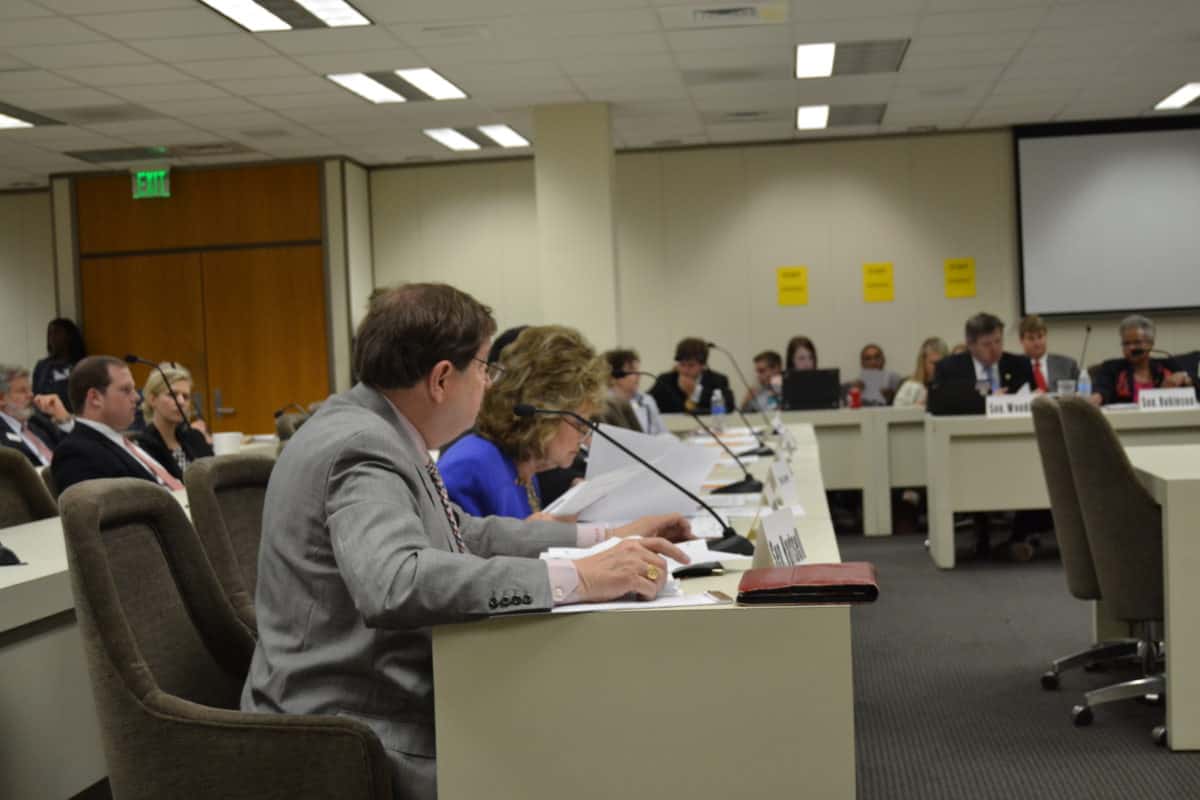The Senate education committee discussed and passed two bills Friday morning. One would allow local boards of education to lease school buildings to private companies. The other would put five low-performing schools in a district to be run by a superintendent chosen by the State Board of Education. Let’s take a look.
Leasing School Buildings
The first, Senate Bill 554, would allow schools to use local operating dollars to lease school buildings in their district to private companies for construction and renovation purposes.
Proponents of the bill say it gives local school boards — especially in rural areas where facility improvements are often needed — another option on how to finance schools and speed up the process to enter into purchase-lease agreements.
The PCS (proposed committee substitute) that was passed on Friday cleared up some of the potential problems opponents found with the original bill.
Terry Stoops, the director of education studies at the John Locke Foundation, thought the bill was much stronger after the PCS. He said the new language clarifies standards that school boards should use when determining which private developer to pick and includes provisions for approval by local governments.
“It’s a useful way for them to get new facilities in a way that doesn’t bankrupt the county or put unnecessary strain on taxpayers,” Stoops said.
Stoops said it would be better to implement slowly, a few schools at a time, and to take into account student population trends. Robeson County, he said, is leasing schools that may not be needed due to a drop in student enrollment.
“But what Robeson County has proposed is a massive building program that seems to put a lot of risk onto the taxpayers of Robeson County for a long time,” he said.
In a letter to the General Assembly earlier this month, State Treasurer Janet Cowell expressed concerns with the bill’s implications. She warned that it would allow county’s to take on more debt than they could afford and limit their capacity to provide for other necessary services.
Alexandra Forter Sirota, the director of the N.C. Budget and Tax Center at the N.C. Justice Center, said these deals will hurt communities in the long run.
“For many of them, as in the case of the Robeson County example, it’s very clear that county residents will be carrying a heavy debt load to pay for those investments and could lose other public services if revenue gets diverted to pay back that agreement,” Sirota said.
“It ends up perhaps detracting from all the other things that make a classroom a vibrant place for children to learn,” she said.
She added that the state has not supported communities to be able to make necessary investments — like school buildings — with their own revenue sources and has cut back on funding for school construction.
Achievement School District
The second bill that was heard by the committee Friday, House Bill 1080 — known as the Achievement School District bill — would create a pilot program that would place five of the lowest performing elementary schools from different parts of the state in a district controlled by a superintendent of the State Board of Education’s choosing.
The State Board of Education could also choose a for-profit charter operator to run the district. To be a part of the Achievement School District, the school must have a performance score in the lowest 5 percent in the state and must have not exceeded growth in the last three years.
The bill would also create Innovation Zones. which are similar to Achievement School Districts in that they have the same exemptions and flexibility given to charter schools but would continue to be run by public school districts instead of an outside operator. The bill states that if a school district transfers one if its schools to the ASD, it can ask the State Board for permission for an Innovation Zone for three other low-performing schools in its district.
Sen. Chad Barefoot, R-Wake, presented the bill Friday, stressing the importance of taking action to improve the quality of schools that have failed their students for years.
“I hope you agree with me that we can no longer sit idle while students churn through our institutions that show a history of both low performance scores and unacceptable growth,” Barefoot said.
Tension was palpable in the room as several committee members were unable to ask all the questions they had due to Sen. Tillman’s three-question per member and one-hour time limit for the meeting.
Sen. Gladys Robinson, D-Guilford, questioned the need of a new model to address low-performing schools when charter schools already exist to meet needs of students that aren’t being fulfilled by the traditional public school system.
Barefoot responded, “Because charter schools are schools of choice. So what this bill attempts to do is to take a school in a traditional system and use an innovative way to turn it around.”
Sen. Angela Bryant, D-Halifax, found the lack of choice that the ASD schools would have troubling.
“Particularly from a position of race and low-wealth, the idea of coercion into something that is, ‘We’re the government, and we’ve come here to help you, whether you want that help or not,’ … the element of coercion is so pernicious and harmful at multiple levels that there is no way that you can have success out of that level of force by government,” Bryant said.
Barefoot insisted that doing nothing and failing the students is worse.
“We’re talking about a situation in the state that is so bad … that how could you argue to keep doing the same thing?” he said.
According to research presented to the House of Representatives, ASDs have been unsuccessful so far in Tennessee. When committee members brought that evidence up, Barefoot said the comparison wasn’t relevant to North Carolina and that it’s too early to analyze the program’s effectiveness in other states.
The PCS passed by the committee made some substantial changes to the original bill, including:
- Removing the principal turnaround model that would have allowed the local board of education to replace the principal of a low-performing school with one who has proven to turn around similar schools in the past.
- Removing a five-school innovation zone in Charlotte-Mecklenburg Schools that would have been made up of Project LIFT and Beacon Initiative Schools.
- Removing a three-year pilot for up to two local boards of education for a three-school Innovation Zone.
- Requiring criminal history checks for ASD employees.
You can watch the entire committee meeting here.



